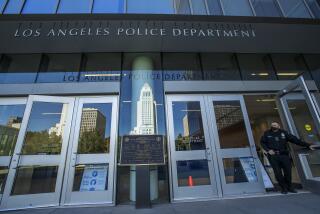CHP Chief Wants to Abolish Teams of Husband and Wife
- Share via
SACRAMENTO — California Highway Patrol Commissioner M.J. (Maury) Hannigan wants to abolish the little-known but suddenly highly visible CHP practice that allows married officers to team up on duty, he has told The Times.
Hannigan conceded that until the Rodney G. King beating by Los Angeles police officers, the issue of CHP spousal teams had never surfaced. It was a husband-and-wife partnership working the graveyard shift March 3 that pursued King’s car on the Foothill Freeway and called for a police backup when the chase turned to surface streets in the San Fernando Valley.
In addition to spouses, fathers and sons as well as brothers and sisters are allowed to work together as partners under a CHP agreement reached with the patrol officers union in the early 1980s.
“I just think it is better served not putting people that are married or blood relatives in an environment together,” the commissioner said in an interview. “It could lead to some very tragic situations with children.”
After the King beating, Hannigan ordered an internal review of whether the CHP’s unusual policy of allowing spousal teams was “appropriate.” Neither Timothy Singer nor Melanie Singer, the CHP officers involved in the case, took part in the beating, but they were reprimanded for failing to file timely reports on the auto chase.
Hannigan, a CHP officer for 28 years and commissioner for the last three, said of spousal teams: “Intuitively, it doesn’t seem to be the right thing to do.”
Hannigan explained that he favors elimination of the practice because it could result in married officers’ children being left as orphans, it might overwhelm cool professional judgment in a life-and-death situation, and spouses could be asked to become witnesses against each other in criminal matters.
Hannigan also said he is considering prohibiting “blood relative” officers from serving as partners, including parents and children, siblings and step-children. Under state law, he must submit any proposed changes in working conditions to the union, the California Assn. of Highway Patrolmen, and consider its recommendations before acting.
A CHP review of its 6,400 uniformed officers indicated that only five or six married couples work as partners, Hannigan said. But the number actually might be greater, he added, because some women retain their maiden names and are not easily identified as spouses. The commissioner said it is not known how many blood relatives work as partners.
Inquiries to other major law enforcement departments in California and elsewhere disclosed that many prohibit the practice of spousal teams and none authorize it, Hannigan said.
Jon Hamm, executive manager of the California Assn. of Highway Patrolmen, said Wednesday he was aware that Hannigan is considering the change, but questioned whether a problem exists.
“My initial reaction is: Is there a definite problem that we’ve had? If not, is there a need to fix it? We have not had any experience with any problems,” Hamm said.
Hannigan conceded as much, but said: “I think that as the administrator of this organization, I have to look beyond that and say, ‘What is the potential problem?’ ”
Among other reasons, he said he questions the policy from the standpoint of the children of a husband-wife officer team who might be killed or seriously wounded in a shootout or other life-and-death incidents. “It could be a tragic situation. That is a lot of where my concern lies,” he said.
Likewise, he said, a CHP spouse’s understandable emotional concern for protection of the other in a “critical” situation might obscure rational judgment and could result in an otherwise preventable mistake.
“There is the potential for being overly concerned with your partner and what they are doing relative to what actions you should be taking,” he said. “Your (professional) partner is one thing. The person you share your life with is something else.”
Hannigan said other “difficult situations” could confront married officers working together if they were called upon in court to testify against each other. “It could be an issue in criminal proceedings,” he said.
More to Read
Sign up for Essential California
The most important California stories and recommendations in your inbox every morning.
You may occasionally receive promotional content from the Los Angeles Times.













